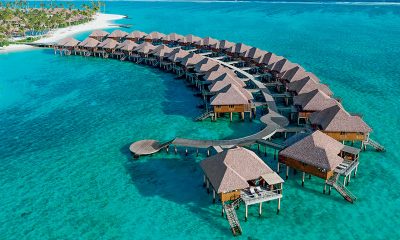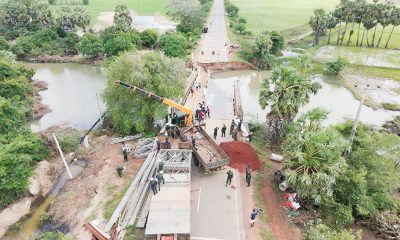Business
Buddhist Circuit Tourist Train launched

By Sanath Nanayakkare
Indian Railway Catering and Tourism Corporation – (IRCTC) together with Lanka Sportreizen, a leader in the leisure industry, recently launched the schedule of Buddhist Special Train (Mahaparinirvana Express).This special luxury train takes Buddhist travellers from across the globe to the most important places related to The Enlightened One’s life and teachings.
Officials from the Indian High Commission in Sri Lanka and representatives from ICTRC were at the launch as the occasion was momentous for the Buddhist community in Sri Lanka.
Kamal Kathiat, Jt. GM- Tourism, Marketing and Corporate Coordination at IRCTC made a comprehensive presentation at the event detailing diverse travel packages and services offered to potential visitors taking the pilgrimage.
“These tour packages can be customized and tailored to cater to the specific interests and preferences of travelers and all of which will be handled by Lanka Sportreizen, our partner in Sri Lanka, Kathiat said.
“Buddhist Circuit Tourist Train forms an important part in the facilities provided for the conduct of Buddhist pilgrimage tours, covering almost all the destinations that relate to the Buddhist Trail, he explained.
Elaborating on the important sites which will be covered by the Buddhist Circuit Train Kathiat said: ‘The luxury train will make its tour over 8 days. It starts in Delhi and concludes in Delhi. It will take you to Bodhgaya – where Prince Siddhartha attained enlightenment under Bodhi tree and became Buddha, “THE ENLIGHTENED ONE”.
‘Nalanda- built on a hallowed site where the Buddha had often stayed.
‘Rajgir – the capital of the mighty Magadha Empire spanning Lord Buddha’s life.
‘Sarnath (Varanasi), where after enlightenment Lord Buddha preached His first sermon to his five disciples.
‘Kushinagar, where Lord Buddha stayed last and entered Mahaparinirwana.
‘Lumbini – the place located in Nepal, where Prince Siddhartha (Lord Buddha) was born.
‘Sravasti, which is sacred to the Buddhists because it was here that Lord Buddha confounded his critics with a million fold manifestation of himself, seated on a thousand-petalled lotus, as fire and water emanated from his body.
‘After completing the tour of Holy Land of Buddha, this train will take you to Agra, a city of historic interest, and is synonymous with Taj, the final resting place of Shah Jahan’s beloved Mumtaz Mahal. Situated on the banks of Yamuna, Taj Mahal is also known as the monument of love.
‘After completing the tour to Agra you have the choice to visit different optional tours given under the heading, “Extension Tour with Mahaparinirvana Train” or continue to Delhi, the capital and the third largest city of India, which is a fusion of the ancient and the modern.
‘Buddhist Circuit Special Train is comfortable and easy to travel. You will get sufficient time to visit temples and participate in prayers etc. and this journey will be comfortable because of very less road travel.
‘Our sincere effort is to promote the Buddhist Pilgrimage by Buddhist Circuit Special Train to make tourists or pilgrims make a memorable visit.’
Lanka Sportreizen, owned and operated by Thilak Weerasinghe is coordinating these tours from Sri Lanka. According to Thilak, special packages could be arranged for families and groups on request.
For further information, please contact: Ms. Promila Gupta via ggmtourism@irctc.com – or Thilak Weerasinge, Secretary, via
marketing@Lsrtravel.com
Business
Tea market grappling with headwinds as 2025 comes to an end

As the curtain prepares to fall on Sri Lanka’s tea trading year, the penultimate auction of 2025 has painted a picture of a market grappling with headwinds. The sale, catalogued in the aftermath of the disruptive Cyclone Ditwah, presented 6.0 million kilograms to the trade, but was met with a predominantly bearish sentiment, casting a reflective shadow over the year’s closing.
The High and Medium Grown offerings, particularly from the Ex-Estate sector, set a cautious tone. With overall quality described as barely maintained, prices faced downward pressure. The better liquoring Western BOP/BOPF varieties, often a market bellwether, declined by up to Rs. 50 per kg. This easing trend rippled through the Below Best and Plainer categories, which were often cheaper by Rs. 20-40 per kg. Regional nuances were evident: Nuwara Eliya teas remained sluggish, Uda Pussellawa listings weakened, and Uva varieties were mostly steady only where quality was exceptionally upheld, with others declining. The CTC segment mirrored this fragility, with PF1s generally easier by Rs. 20 per kg, while the very bottom end of the market faced severe challenges, becoming at times unsellable.
This internal market dynamic was compounded by a notable sluggishness in global demand. The report notes a concerning inactivity from traditional buyers in the UK and the European continent. While shippers to Japan, China, the CIS, and the Middle East continued to operate, they did so at lower levels of engagement. Activity from South Africa was described as virtually absent, underscoring a broader pattern of restrained international participation.
In stark contrast to this overarching bearishness, the Low Growns sector emerged as a relative bastion of stability. With approximately 2.45 million kilograms on offer, this category witnessed fair demand across the board. In the Leafy and Semi-Leafy catalogues, Select Best and Best BOP1s held firm, with others even appreciating. Well-made OP1s also generally maintained their ground, though poorer teas at the bottom saw substantial declines. The Tippy and Premium catalogues told a similar story of selectivity, where well-made FBOPs, Very Tippy teas, and the best varieties either held firm or appreciated, while poorer descriptions faced irregular and easier conditions.
The tale of this penultimate sale, therefore, is one of a stark dichotomy. The market narrative bifurcates into a struggling, quality-sensitive mainstream estate sector weighed down by climatic after-effects and muted Western demand, and a more resilient Low Growns market where quality continues to find its price. This divergence highlights the increasingly selective nature of the global tea trade.
As the industry looks toward the final sale and the year’s reckoning, the events of this penultimate auction offer sobering reflection. The impact of Cyclone Ditwah, both real and psychological, coupled with the cautious stance of key international buyers, has applied palpable pressure. Yet, the enduring firmness for the best Low Grown teas provides a counter-note of confidence, suggesting that in an uncertain global environment, uncompromising quality and specific origin characteristics remain Sri Lanka’s most reliable assets. The challenge heading into the new year will be navigating this two-tiered reality.
By Sanath Nanayakkare ✍️
Business
First Capital to restore 15 acres of forest through partnership with WNPS

First Capital Holdings PLC, a subsidiary of JXG (Janashakthi Group) and Sri Lanka’s pioneering full-service investment institution, announced the signing of a Memorandum of Understanding (MoU) with the Wildlife and Nature Protection Society (WNPS) through its PLANT initiative (Preserving Land and Nature (Guarantee) Limited) to support a large-scale forest restoration initiative in the central highlands of Sri Lanka.
First Capital’s sustainability journey is anchored in the belief that long-term success stems from empowering people through financial literacy and responsible social and environmental practices. At the heart of our agenda is a commitment to advancing financial stability, enabling individuals and communities to make informed financial decisions, build economic strength and contribute meaningfully to national development.
This core focus is complemented by initiatives in community engagement, climate action, and environmental protection, ensuring a balanced approach to sustainable growth. Aligned with SLFRS S2 and global best practices, we champion programmes that promote inclusive progress, sustainable development and long-term wellbeing across Sri Lanka. By embedding financial literacy and sustainability into our core strategies, we aspire to create a financially empowered and environmentally conscious nation.
Business
Access Engineering gets contract for 615-unit housing project in Kirulapone

The Cabinet of Ministers has approved the proposal presented by Transport, Highways and Urban Development Minister Anura Karunathilake on the recommendation of the Cabinet appointed standing procurement committee to award Access Engineering PLC the contract to build 615 housing units at Colombage Mawatha, Kirulapone, which had been stalled.
On 30 December 2024, the Cabinet of Ministers approved following the relevant procurement process to select a contractor for the design and construction of the remaining works of the project.
“Accordingly, the Urban Development Authority (UDA) has invited bids and four bids have been received,” Cabinet Spokesman and Minister Dr. Nalinda Jayatissa said at the weekly post-Cabinet meeting media briefing yesterday.
He said the Cabinet of Ministers approved awarding the relevant contract to Access Engineering PLC based on the recommendations submitted by the High Level Standing Procurement Committee regarding these bids.
-

 News3 days ago
News3 days agoMembers of Lankan Community in Washington D.C. donates to ‘Rebuilding Sri Lanka’ Flood Relief Fund
-

 Latest News6 days ago
Latest News6 days agoLandslide early warnings issued to the districts of Badulla, Kandy, Kurunegala, Matale and Nuwara-Eliya extended till 8AM on Sunday (21)
-

 News4 days ago
News4 days agoAir quality deteriorating in Sri Lanka
-

 Business5 days ago
Business5 days agoBrowns Investments sells luxury Maldivian resort for USD 57.5 mn.
-

 Editorial6 days ago
Editorial6 days agoCops as whipping boys?
-

 News4 days ago
News4 days agoCardinal urges govt. not to weaken key socio-cultural institutions
-

 Features5 days ago
Features5 days agoAnother Christmas, Another Disaster, Another Recovery Mountain to Climb
-

 Features5 days ago
Features5 days agoHatton Plantations and WNPS PLANT Launch 24 km Riparian Forest Corridor













